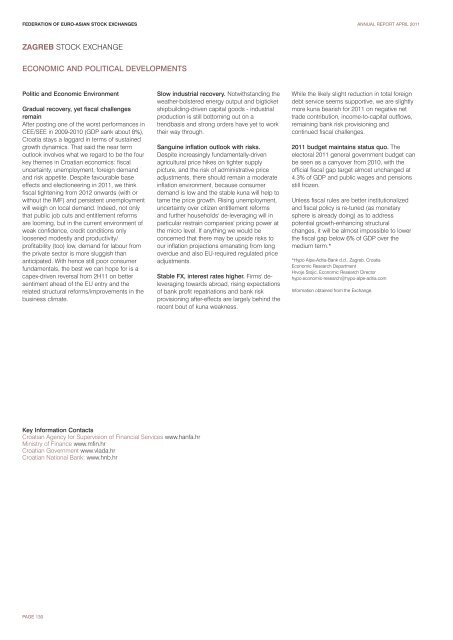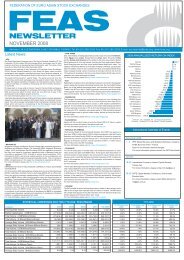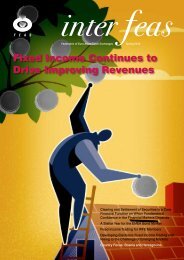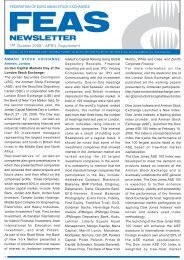Download - FEAS
Download - FEAS
Download - FEAS
Create successful ePaper yourself
Turn your PDF publications into a flip-book with our unique Google optimized e-Paper software.
FEDERATION OF EURO-ASIAN STOCK EXCHANGES ANNUAL REPORT APRIL 2011<br />
ZAGREB STOCK EXCHANGE<br />
ECONOMIC AND POLITICAL DEVELOPMENTS<br />
Politic and Economic Environment<br />
Gradual recovery, yet fiscal challenges<br />
remain<br />
After posting one of the worst performances in<br />
CEE/SEE in 2009-2010 (GDP sank about 8%),<br />
Croatia stays a laggard in terms of sustained<br />
growth dynamics. That said the near term<br />
outlook involves what we regard to be the four<br />
key themes in Croatian economics: fiscal<br />
uncertainty, unemployment, foreign demand<br />
and risk appetite. Despite favourable base<br />
effects and electioneering in 2011, we think<br />
fiscal tightening from 2012 onwards (with or<br />
without the IMF) and persistent unemployment<br />
will weigh on local demand. Indeed, not only<br />
that public job cuts and entitlement reforms<br />
are looming, but in the current environment of<br />
weak confidence, credit conditions only<br />
loosened modestly and productivity/<br />
profitability (too) low, demand for labour from<br />
the private sector is more sluggish than<br />
anticipated. With hence still poor consumer<br />
fundamentals, the best we can hope for is a<br />
capex-driven reversal from 2H11 on better<br />
sentiment ahead of the EU entry and the<br />
related structural reforms/improvements in the<br />
business climate.<br />
Slow industrial recovery. Notwithstanding the<br />
weather-bolstered energy output and bigticket<br />
shipbuilding-driven capital goods - industrial<br />
production is still bottoming out on a<br />
trendbasis and strong orders have yet to work<br />
their way through.<br />
Sanguine inflation outlook with risks.<br />
Despite increasingly fundamentally-driven<br />
agricultural price hikes on tighter supply<br />
picture, and the risk of administrative price<br />
adjustments, there should remain a moderate<br />
inflation environment, because consumer<br />
demand is low and the stable kuna will help to<br />
tame the price growth. Rising unemployment,<br />
uncertainty over citizen entitlement reforms<br />
and further households' de-leveraging will in<br />
particular restrain companies' pricing power at<br />
the micro level. If anything we would be<br />
concerned that there may be upside risks to<br />
our inflation projections emanating from long<br />
overdue and also EU-required regulated price<br />
adjustments.<br />
Stable FX, interest rates higher. Firms' deleveraging<br />
towards abroad, rising expectations<br />
of bank profit repatriations and bank risk<br />
provisioning after-effects are largely behind the<br />
recent bout of kuna weakness.<br />
While the likely slight reduction in total foreign<br />
debt service seems supportive, we are slightly<br />
more kuna bearish for 2011 on negative net<br />
trade contribution, income-to-capital outflows,<br />
remaining bank risk provisioning and<br />
continued fiscal challenges.<br />
2011 budget maintains status quo. The<br />
electoral 2011 general government budget can<br />
be seen as a carryover from 2010, with the<br />
official fiscal gap target almost unchanged at<br />
4.3% of GDP and public wages and pensions<br />
still frozen.<br />
Unless fiscal rules are better institutionalized<br />
and fiscal policy is re-tuned (as monetary<br />
sphere is already doing) as to address<br />
potential growth-enhancing structural<br />
changes, it will be almost impossible to lower<br />
the fiscal gap below 6% of GDP over the<br />
medium term.*<br />
*Hypo Alpe-Adria-Bank d.d., Zagreb, Croatia<br />
Economic Research Department<br />
Hrvoje Stojic, Economic Research Director<br />
hypo.economic-research@hypo-alpe-adria.com<br />
Information obtained from the Exchange.<br />
Key Information Contacts<br />
Croatian Agency for Supervision of Financial Services www.hanfa.hr<br />
Ministry of Finance www.mfin.hr<br />
Croatian Government www.vlada.hr<br />
Croatian National Bank: www.hnb.hr<br />
PAGE 130
















